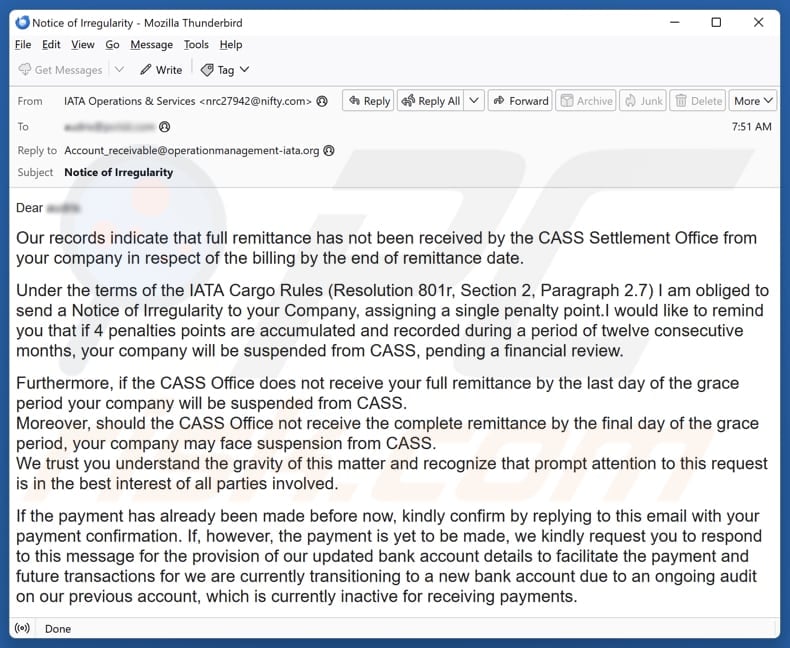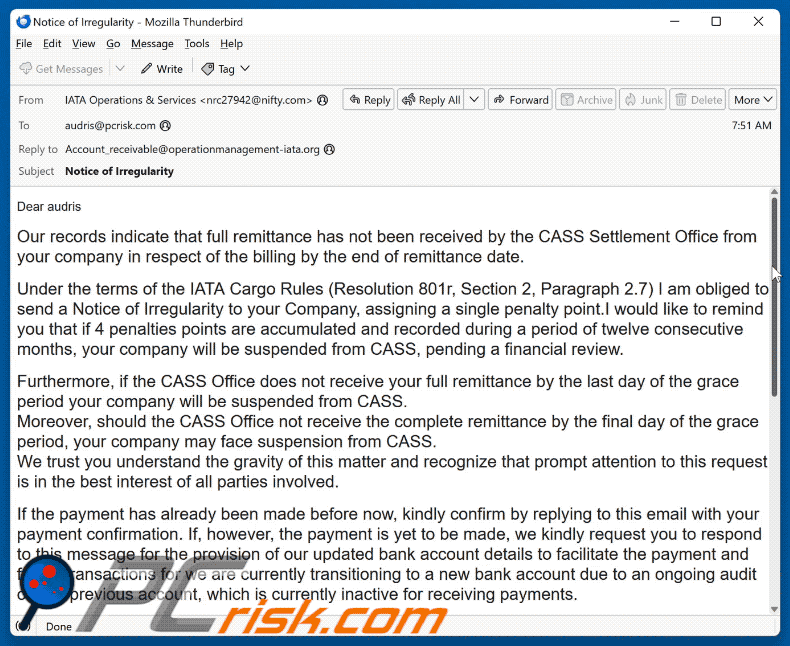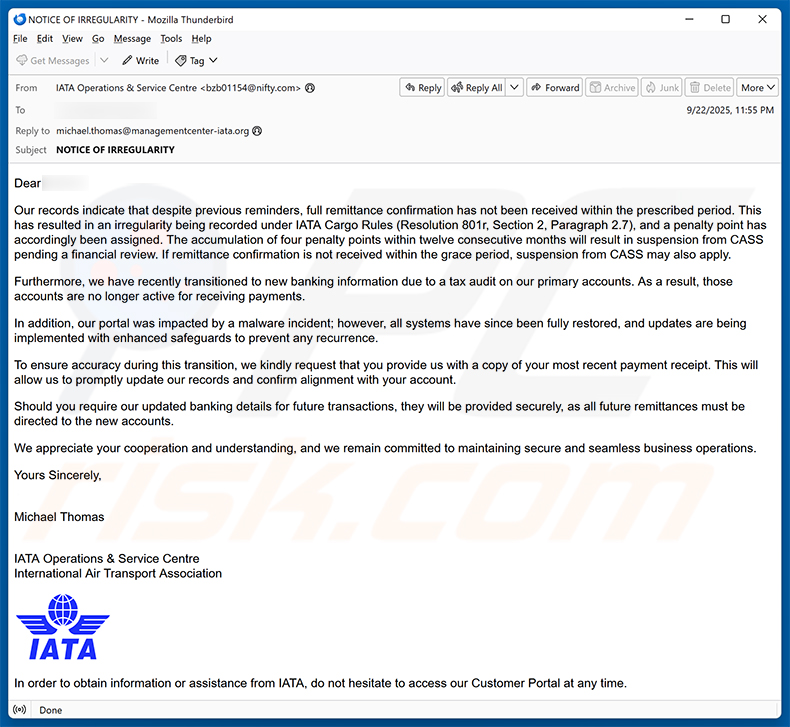How to identify scams like "International Air Transport Association (IATA)"
Phishing/ScamAlso Known As: International Air Transport Association (IATA) scam email
Get free scan and check if your device is infected.
Remove it nowTo use full-featured product, you have to purchase a license for Combo Cleaner. Seven days free trial available. Combo Cleaner is owned and operated by RCS LT, the parent company of PCRisk.com.
What kind of scam is "International Air Transport Association (IATA)"?
We have examined the email and concluded that it is disguised as a notice of irregularity from the "Air Transport Association". The scammers behind it likely seek to trick recipients into disclosing personal information or transferring money (paying for fake services). This email should be ignored.

More about the "International Air Transport Association (IATA)" scam email
This scam email claims that the recipient has failed to remit full payment to the CASS Settlement Office by the due date. It warns of accumulating penalty points and suggests that reaching a total of four within a twelve-month period would result in the company's suspension from CASS, pending a financial review.
The email also states that failure to remit payment by the end of the specified period would also lead to suspension. It urges the recipient to act immediately to avoid consequences. Additionally, the message encourages the recipient to confirm payment if it has already been made.
If not, it requests a reply in order to provide updated bank account details, claiming that IATA is undergoing a bank transition due to an audit. However, this email is fraudulent and designed to trick the recipient into making payments (e.g., paying "administration" fees) or disclosing information like credit card details.
Either way, this is a scam, and it should be ignored. Falling for such scams can lead to issues like monetary loss or identity theft.
| Name | International Air Transport Association (IATA) Email Scam |
| Threat Type | Phishing, Scam, Social Engineering, Fraud |
| Fake Claim | The recipient has failed to remit full payment to the CASS Settlement Office |
| Disguise | Notification from IATA Operations & Service Centre |
| Symptoms | Unauthorized online purchases, changed online account passwords, identity theft, illegal access of the computer. |
| Distribution methods | Deceptive emails, rogue online pop-up ads, search engine poisoning techniques, misspelled domains. |
| Damage | Loss of sensitive private information, monetary loss, identity theft. |
| Malware Removal (Windows) |
To eliminate possible malware infections, scan your computer with legitimate antivirus software. Our security researchers recommend using Combo Cleaner. Download Combo CleanerTo use full-featured product, you have to purchase a license for Combo Cleaner. 7 days free trial available. Combo Cleaner is owned and operated by RCS LT, the parent company of PCRisk.com. |
Conclusion
Such emails are designed to appear urgent legitimate in order to trick recipients into taking action (e.g., sending money or information to scammers). It is important to examine suspicious emails, especially if they are irrelevant or unexpected. Some examples of similar scams are "Internet Crime Complaint Center", "Fidelity Investments", and "World Bank Empowerment Programme".
Sometimes, fraudsters can use such emails to distribute malware.
How do spam campaigns infect computers?
Cybercriminals distribute malware through email by attaching infected files, such as PDFs, Office documents, executables (.exe), scripts, or files like ZIP and RAR. Opening these attachments (or enabling features like macros) can result in malware being executed on devices.
Another common tactic is including a link within the email. Clicking the link may direct the user to a malicious website that either initiates a malware download automatically or tricks the user into downloading it manually.
How to avoid installation of malware?
Always inspect emails, especially when they contain links or attachments. Do not open files or links in irrelevant, unexpected emails from shady senders. Avoid interacting with pop-ups, ads, or buttons on questionable websites, and never allow these sites to send notifications.
Always download software and files from official sources, such as trusted websites or app stores. Do not use pirated software, unofficial activation tools, or keygens. Also, keep your operating system and applications updated, and use reliable antivirus software. If you have already opened malicious attachments, we recommend running a scan with Combo Cleaner Antivirus for Windows to automatically eliminate infiltrated malware.
The appearance of the "International Air Transport Association (IATA)" scam email (GIF):

Text presented in the email:
Subject: Notice of Irregularity
Notice of Irregularity
Dear -
Our records indicate that full remittance has not been received by the CASS Settlement Office from your company in respect of the billing by the end of remittance date.
Under the terms of the IATA Cargo Rules (Resolution 801r, Section 2, Paragraph 2.7) I am obliged to send a Notice of Irregularity to your Company, assigning a single penalty point.I would like to remind you that if 4 penalties points are accumulated and recorded during a period of twelve consecutive months, your company will be suspended from CASS, pending a financial review.
Furthermore, if the CASS Office does not receive your full remittance by the last day of the grace period your company will be suspended from CASS.
Moreover, should the CASS Office not receive the complete remittance by the final day of the grace period, your company may face suspension from CASS.
We trust you understand the gravity of this matter and recognize that prompt attention to this request is in the best interest of all parties involved.If the payment has already been made before now, kindly confirm by replying to this email with your payment confirmation. If, however, the payment is yet to be made, we kindly request you to respond to this message for the provision of our updated bank account details to facilitate the payment and future transactions for we are currently transitioning to a new bank account due to an ongoing audit on our previous account, which is currently inactive for receiving payments.
Yours Sincerely,
Rehema Abdi,
IATA Operations & Service Centre - Europe
International Air Transport Association
Another example of an email from "International Air Transport Association (IATA)" spam campaign:

Text presented within:
Subject: NOTICE OF IRREGULARITY
Dear ,
Our records indicate that despite previous reminders, full remittance confirmation has not been received within the prescribed period. This has resulted in an irregularity being recorded under IATA Cargo Rules (Resolution 801r, Section 2, Paragraph 2.7), and a penalty point has accordingly been assigned. The accumulation of four penalty points within twelve consecutive months will result in suspension from CASS pending a financial review. If remittance confirmation is not received within the grace period, suspension from CASS may also apply.
Furthermore, we have recently transitioned to new banking information due to a tax audit on our primary accounts. As a result, those accounts are no longer active for receiving payments.
In addition, our portal was impacted by a malware incident; however, all systems have since been fully restored, and updates are being implemented with enhanced safeguards to prevent any recurrence.
To ensure accuracy during this transition, we kindly request that you provide us with a copy of your most recent payment receipt. This will allow us to promptly update our records and confirm alignment with your account.
Should you require our updated banking details for future transactions, they will be provided securely, as all future remittances must be directed to the new accounts.
We appreciate your cooperation and understanding, and we remain committed to maintaining secure and seamless business operations.
Yours Sincerely,
Michael Thomas
IATA Operations & Service Centre
International Air Transport AssociationIn order to obtain information or assistance from IATA, do not hesitate to access our Customer Portal at any time.
Instant automatic malware removal:
Manual threat removal might be a lengthy and complicated process that requires advanced IT skills. Combo Cleaner is a professional automatic malware removal tool that is recommended to get rid of malware. Download it by clicking the button below:
DOWNLOAD Combo CleanerBy downloading any software listed on this website you agree to our Privacy Policy and Terms of Use. To use full-featured product, you have to purchase a license for Combo Cleaner. 7 days free trial available. Combo Cleaner is owned and operated by RCS LT, the parent company of PCRisk.com.
Quick menu:
- What is International Air Transport Association (IATA) scam email?
- Types of malicious emails.
- How to spot a malicious email?
- What to do if you fell for an email scam?
Types of malicious emails:
![]() Phishing Emails
Phishing Emails
Most commonly, cybercriminals use deceptive emails to trick Internet users into giving away their sensitive private information, for example, login information for various online services, email accounts, or online banking information.
Such attacks are called phishing. In a phishing attack, cybercriminals usually send an email message with some popular service logo (for example, Microsoft, DHL, Amazon, Netflix), create urgency (wrong shipping address, expired password, etc.), and place a link which they hope their potential victims will click on.
After clicking the link presented in such email message, victims are redirected to a fake website that looks identical or extremely similar to the original one. Victims are then asked to enter their password, credit card details, or some other information that gets stolen by cybercriminals.
![]() Emails with Malicious Attachments
Emails with Malicious Attachments
Another popular attack vector is email spam with malicious attachments that infect users' computers with malware. Malicious attachments usually carry trojans that are capable of stealing passwords, banking information, and other sensitive information.
In such attacks, cybercriminals' main goal is to trick their potential victims into opening an infected email attachment. To achieve this goal, email messages usually talk about recently received invoices, faxes, or voice messages.
If a potential victim falls for the lure and opens the attachment, their computers get infected, and cybercriminals can collect a lot of sensitive information.
While it's a more complicated method to steal personal information (spam filters and antivirus programs usually detect such attempts), if successful, cybercriminals can get a much wider array of data and can collect information for a long period of time.
![]() Sextortion Emails
Sextortion Emails
This is a type of phishing. In this case, users receive an email claiming that a cybercriminal could access the webcam of the potential victim and has a video recording of one's masturbation.
To get rid of the video, victims are asked to pay a ransom (usually using Bitcoin or another cryptocurrency). Nevertheless, all of these claims are false - users who receive such emails should ignore and delete them.
How to spot a malicious email?
While cyber criminals try to make their lure emails look trustworthy, here are some things that you should look for when trying to spot a phishing email:
- Check the sender's ("from") email address: Hover your mouse over the "from" address and check if it's legitimate. For example, if you received an email from Microsoft, be sure to check if the email address is @microsoft.com and not something suspicious like @m1crosoft.com, @microsfot.com, @account-security-noreply.com, etc.
- Check for generic greetings: If the greeting in the email is "Dear user", "Dear @youremail.com", "Dear valued customer", this should raise suspiciousness. Most commonly, companies call you by your name. Lack of this information could signal a phishing attempt.
- Check the links in the email: Hover your mouse over the link presented in the email, if the link that appears seems suspicious, don't click it. For example, if you received an email from Microsoft and the link in the email shows that it will go to firebasestorage.googleapis.com/v0... you shouldn't trust it. It's best not to click any links in the emails but to visit the company website that sent you the email in the first place.
- Don't blindly trust email attachments: Most commonly, legitimate companies will ask you to log in to their website and to view any documents there; if you received an email with an attachment, it's a good idea to scan it with an antivirus application. Infected email attachments are a common attack vector used by cybercriminals.
To minimise the risk of opening phishing and malicious emails we recommend using Combo Cleaner Antivirus for Windows.
Example of a spam email:

What to do if you fell for an email scam?
- If you clicked on a link in a phishing email and entered your password - be sure to change your password as soon as possible. Usually, cybercriminals collect stolen credentials and then sell them to other groups that use them for malicious purposes. If you change your password in a timely manner, there's a chance that criminals won't have enough time to do any damage.
- If you entered your credit card information - contact your bank as soon as possible and explain the situation. There's a good chance that you will need to cancel your compromised credit card and get a new one.
- If you see any signs of identity theft - you should immediately contact the Federal Trade Commission. This institution will collect information about your situation and create a personal recovery plan.
- If you opened a malicious attachment - your computer is probably infected, you should scan it with a reputable antivirus application. For this purpose, we recommend using Combo Cleaner Antivirus for Windows.
- Help other Internet users - report phishing emails to Anti-Phishing Working Group, FBI’s Internet Crime Complaint Center, National Fraud Information Center and U.S. Department of Justice.
Frequently Asked Questions (FAQ)
Why did I receive this email?
Scammers send the same message to thousands of people at once. These emails are not personal and are created to trick as many people as possible. Usually, scammers obtain email addresses from data breaches, fake sites, or similar sources.
I have provided my personal information when tricked by this email, what should I do?
If you have shared any account login details, change your passwords right away. If you have given out other personal information, like credit card numbers or ID details, contact the relevant authorities immediately.
I have downloaded and opened a malicious file attached to an email, is my computer infected?
If the file is an executable, it is very likely that your system is infected. However, if it is a document (like a PDF or Word file), you might have avoided infection, since opening these types of files is not always enough for malware to be launched.
I have sent cryptocurrency to the address presented in such email, can I get my money back?
These transactions are nearly impossible to trace, which means recovering the funds is unlikely.
I have read the email but didn't open the attachment, is my computer infected?
No, simply opening an email is safe. Malware can infect computers after clicking on malicious links or opening attachments.
Will Combo Cleaner remove malware infections that were present in email attachment?
Yes, Combo Cleaner can detect and remove nearly all known malware infections. However, advanced malware often hides deep within the system, so it is important to run a full system scan to ensure thorough detection and removal.
Share:

Tomas Meskauskas
Expert security researcher, professional malware analyst
I am passionate about computer security and technology. I have an experience of over 10 years working in various companies related to computer technical issue solving and Internet security. I have been working as an author and editor for pcrisk.com since 2010. Follow me on Twitter and LinkedIn to stay informed about the latest online security threats.
PCrisk security portal is brought by a company RCS LT.
Joined forces of security researchers help educate computer users about the latest online security threats. More information about the company RCS LT.
Our malware removal guides are free. However, if you want to support us you can send us a donation.
DonatePCrisk security portal is brought by a company RCS LT.
Joined forces of security researchers help educate computer users about the latest online security threats. More information about the company RCS LT.
Our malware removal guides are free. However, if you want to support us you can send us a donation.
Donate
▼ Show Discussion